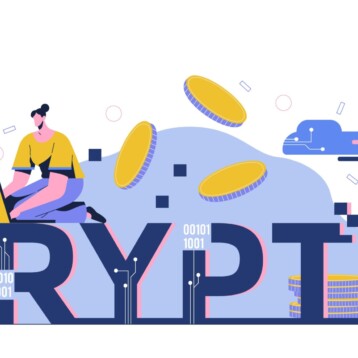Cryptocurrencies are a fully-digitalized form of currency, leveraging cryptography for secure transactions and decentralization for transaction records. The system crypto is based on is free from central authority – instead, it relies on multiple points of control across the world, such as nodes, miners, and validators, who receive incentives for their supporting work.

However, cryptocurrencies cannot live on random networks, which is why blockchain exists. A public ledger records and secures all transactions so investors can work with cryptocurrencies through digital wallets. Digital coins like Bitcoin and Ethereum have some of the biggest and most complex blockchain ecosystems, in which both the BTC and ETH price thrive due to continuous innovation and developer efforts.
Without the blockchain, these cryptocurrencies couldn’t improve because their technology advances and supports faster and cheaper transactions, managing network congestion, and other challenges. So, let’s see what the benefits of blockchain for cryptocurrencies are.
Blockchain Improves Transactions
Blockchain is known as one of the fastest financial environments, as transactions can be completed in minutes or seconds, depending on the network’s condition. For instance, Bitcoin transactions receive confirmations in about ten minutes and up to a day, whereas Ethereum ones can take even one minute to process.
Blockchains also receive frequent updates that make them more efficient every now and then. For instance, the Ethereum blockchain is continuously patched with improvements that reduce fee transactions and verification time and increase block production. The update is known as “the Merge” and settled the switch from the PoW consensus mechanism to PoS, which reduced the network’s energy consumption by 99.95.
Blockchain supports high levels of security
Financial ecosystems are always the target of cybersecurity attacks since they hold massive amounts of data. That’s where blockchains come in. They make it almost impossible for hackers to take advantage of system vulnerabilities, as no one can alter records already live on the blockchain, as they’re encrypted end-to-end.
Strong technologies support both public and private blockchains. Public ones benefit from processes like mining, which secures the network. On the other hand, private blockchains require identity proof for individuals to access privileges, giving them permissions so only a certain number of selected users can enter them.
Blockchain ensure automation
Automation is the technology of the future because it helps humans on important tasks while the computer or system is responsible for the boring and time-consuming activities. One of these automation technologies on the blockchain includes the “smart contract”, which automatically starts the transaction process when the two parties agree on their pre-set terms.
With smart contracts, cryptocurrency transactions don’t require much human intervention or need of other third parties, which makes them so efficient and fast. Smart contracts offer the benefits of trust and transparency, security and accuracy, and they’ve already entered our real world. Smart contracts are now useful in supply chain transparency, international trade and retailer-supplier communication.
Blockchain provides the means of traceability
Everything on the blockchain can be traced by users, as assets are recorded at every step of their journey, from being introduced to the network to being traded with other users. This is especially true in public blockchains, where anyone can see people’s transaction history, but not interfere.
Usually, this aspect is beneficial for investors who follow whales’ movements in order to adjust their strategies. Crypto whales are investors whose assets are large enough to trigger a market change when trading. Satoshi Nakamoto, for example, is the biggest whale that’s believed to hold about one million Bitcoins.
Blockchains allow individuals to control their data
In a world where data is the most important element in companies; success, blockchain offers individuals the chance to control their own data. Since people can use blockchain and invest in cryptocurrencies anonymously even, and they don’t have to provide a ton of information about them, the evolution of data usage is right under our eyes.
Data ownership is considerably appreciated at the moment, given how any type of company relies heavily on customer data to provide the best products and services. That’s why blockchain-based smart contracts allow customers to decide how much data they want to share and for how long.
Still, blockchain must mitigate its challenges
Unfortunately, blockchain isn’t perfect, meaning it needs to solve some of its problems before being a widely used tool in the real world. Companies in finance, healthcare, and government agencies started briefly exploring blockchain to manage their massive databases, but they’re navigating some of the blockchain’s most prominent issues, such as the following:
- Integration. Considering our current technological emergence, integrating blockchain and its decentralization features will pose various difficulties as companies will not only have to address new methods but also train employees or find talented ones;
- Complexity. Blockchain is a new technological advancement that’s not quite simple to understand or use, requiring specific knowledge and experience for those whose jobs will be maintaining it;
- Regulations. Due to the lack of proper settlement on cryptocurrencies, blockchain is evolving in an uncertain environment, which can signify cybersecurity risks for investors;
- Scalability. As blockchains expand, they need more maintenance to support the increasing number of users and information. Otherwise, it will get slower and more expensive to maintain;
Will blockchain and crypto and blockchain be adopted soon?
A few optimistic investors believe that cryptocurrency will be widely used as a means of payment and exchange in about ten years. At the same time, proper regulation may be enforced in this direction.
Since more and more companies are approaching crypto and blockchain, the time span seems enough for the industry to settle in a direction and be safe enough for the wide public. Since the pandemic, interest in digital currencies has grown exponentially, and now, due to their boost, we’re witnessing a major change in the financial sector.
What’s your take on blockchain technology?
Blockchain technology holds cryptocurrency in place, ensuring high levels of security. Millions of nodes, validators, and miners across the world work to secure the ecosystem, which makes crypto transactions fast, safe, and productive.










